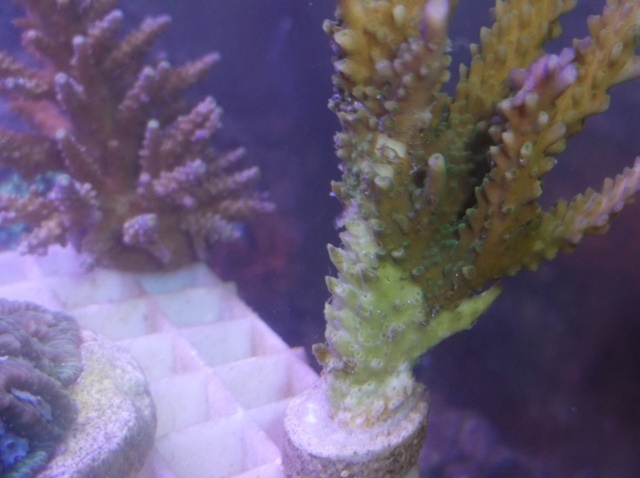I am absolutely serious when I say that there is a full blown "psychological journey" that I go on every time I happen upon the simplest malady in one of the pieces of my collection. More often, a small bit of exposed skeleton somewhere at the base, or somewhere on the body. Or it could be simple polyp retraction, or just a general sense that something is off. It can be a ferocious and overwhelming feeling, but this is a process I have come to fully understand, and even sometimes able to ignore over the years - but I will never be used to it. No matter how many times I have to go through this process, I’ve gotten a lot better at not freaking out completely, my coping mechanisms are never consistent either.

I am going to try to put this process in words for you the best I can in hopes that we can all try to understand and feel more at ease when we discover things that terrify us. Admit it, you have been there at least once or twice.
First off, we must first discover the issue. While browsing over an otherwise healthy, or “normal” collection, but still carrying an expectation for something unexpected, I’ll notice something’s off, usually in just one particular coral, but maybe more than one. (I’ll expand on this later) No matter how many times I experience this initial discovery, many many times now, I still feel it. My heart starts beating a little faster, and casual enjoyable viewing of my collection has now rooted itself into nervous anxiety. I’ll then do a closer inspection to confirm that I am actually seeing something that I’m not supposed to be seeing - followed then by visual confirmation.

Whether it’s a small patch of tissue necrosis or a flake of exposed skeleton somewhere on the coral body, at this point I can not deny what is in front of me. And I am now in a different mode completely. A casual and pleasant moment with my specimens has now become a moderately dire situation. No matter how minute my discovery may be, I will not be able to enjoy the collection again like I had before the discovery until the concern has been quelled or eliminated. I have come to accept the fact that even when things are doing well, I am always in some way preparing myself mentally to find something that I will be surprised by. I know that I have conditioned myself to this state over the years. My ritualistic morning check of the collection is generally one of hopeful but nervous expectation, followed by gentle relief if things look fine, or a continued mental acceptance of whatever oddity I may see or discover, rather than the shock I may experience if I had not been expecting to see something.
Next comes a full system scan. This step immediately follows the visual confirmation of anything from a speck of exposed skeleton, to severe polyp retraction or tissue loss of any amount. I’ll do a rapid (not frantic) scan of everything else in the tank, beginning with any duplicates of the afflicted coral, for any symptom similar to what I have discovered. This is actually is a huge deal because, what happens next will determine any further course of action. If after a thorough looking over, I cannot find another single instance of the initial issue that prompted the scan, I will usually exhale, call it a fluke and ride it out for at least couple days, taking no action at this point. However, if I find the exact symptom or symptoms in two or more pieces, my concerns become a little more sincere, as now I can’t easily pass this off as a fluke. I’ll admit, seeing the condition in a second piece is probably more nerve racking than the initial discovery, because at that point I feel that I may actually have a problem. I am already running through crash scenarios and contingencies for whatever may be heading down the pipe. A bit of an overreaction at this point, but I always skip right to the worst case scenario in my thought processes. However disastrous that may be, from loosing one or two entire colonies, to a total sweeping and devastating tank crash. This doomsday approach is inevitably where my mind rushes to - every time.

And finally, If I do discover two or more pieces with similar symptoms, even though my instinct is really urging me to react, the decision I face now is - do I react immediately, and if so, what’s my course of action? Or do I simply ride it out? Normally, unless it’s something like cloudy water, or an obvious issue like a parameter swing that I can immediately address, I’ll ride it out for at least one night or two and hope things just recover on their own - or at the very least don’t get any worse.
The good news here is that, a lot of the times, not always, but often, things do seem to work themselves out with little or no intervention by me at all, and the process stops here until the next incident. And even if the coral's are clearly going down hill fast, as long as the symptoms don't pop up in anything else, I will also ride it out indefinitely and simply call it a fluke. Believe me I’ve had tons of these “flukes” over the years and I’ve gotten a lot better at dealing with them, but again I will never be “used” to them. This I am sure of, as the myriad of possible issues that can affect our tanks and coral is essentially limitless, and the second I find myself in a sort of semi-stasis with the tank, perhaps after a longer period without any incident, the rug’s pulled out the second I see that teeny tiny patch of white skeleton and I revert back to the third paragraph again.

What I have really learned over the years, after dealing with countless unexplained coral maladies and nerve shakers, is that there is a time to react - and a time to sit still. More often than not, at least in my case, sitting still has always the best plan of attack. I’ve had corals half, or nearly all dead, stop receding, and recover on their own almost like magic, and I've had lots more just keep going till they are all done dying on me. I don't believe anything I may have done at this point would have prevented their demise, short of cutting a frag in an effort to preserve the line. I truly think the best weapon we can have against these tumultuous and neurosis inducing instances, is to stay as calm and cool as we can, and try our very hardest not to go "bananas" - even if our brain has done its best to prepare us for the absolute worst case scenario it can come up with and is vehemently instructing us to do the exact opposite.

I am going to try to put this process in words for you the best I can in hopes that we can all try to understand and feel more at ease when we discover things that terrify us. Admit it, you have been there at least once or twice.
First off, we must first discover the issue. While browsing over an otherwise healthy, or “normal” collection, but still carrying an expectation for something unexpected, I’ll notice something’s off, usually in just one particular coral, but maybe more than one. (I’ll expand on this later) No matter how many times I experience this initial discovery, many many times now, I still feel it. My heart starts beating a little faster, and casual enjoyable viewing of my collection has now rooted itself into nervous anxiety. I’ll then do a closer inspection to confirm that I am actually seeing something that I’m not supposed to be seeing - followed then by visual confirmation.

Whether it’s a small patch of tissue necrosis or a flake of exposed skeleton somewhere on the coral body, at this point I can not deny what is in front of me. And I am now in a different mode completely. A casual and pleasant moment with my specimens has now become a moderately dire situation. No matter how minute my discovery may be, I will not be able to enjoy the collection again like I had before the discovery until the concern has been quelled or eliminated. I have come to accept the fact that even when things are doing well, I am always in some way preparing myself mentally to find something that I will be surprised by. I know that I have conditioned myself to this state over the years. My ritualistic morning check of the collection is generally one of hopeful but nervous expectation, followed by gentle relief if things look fine, or a continued mental acceptance of whatever oddity I may see or discover, rather than the shock I may experience if I had not been expecting to see something.
Next comes a full system scan. This step immediately follows the visual confirmation of anything from a speck of exposed skeleton, to severe polyp retraction or tissue loss of any amount. I’ll do a rapid (not frantic) scan of everything else in the tank, beginning with any duplicates of the afflicted coral, for any symptom similar to what I have discovered. This is actually is a huge deal because, what happens next will determine any further course of action. If after a thorough looking over, I cannot find another single instance of the initial issue that prompted the scan, I will usually exhale, call it a fluke and ride it out for at least couple days, taking no action at this point. However, if I find the exact symptom or symptoms in two or more pieces, my concerns become a little more sincere, as now I can’t easily pass this off as a fluke. I’ll admit, seeing the condition in a second piece is probably more nerve racking than the initial discovery, because at that point I feel that I may actually have a problem. I am already running through crash scenarios and contingencies for whatever may be heading down the pipe. A bit of an overreaction at this point, but I always skip right to the worst case scenario in my thought processes. However disastrous that may be, from loosing one or two entire colonies, to a total sweeping and devastating tank crash. This doomsday approach is inevitably where my mind rushes to - every time.

And finally, If I do discover two or more pieces with similar symptoms, even though my instinct is really urging me to react, the decision I face now is - do I react immediately, and if so, what’s my course of action? Or do I simply ride it out? Normally, unless it’s something like cloudy water, or an obvious issue like a parameter swing that I can immediately address, I’ll ride it out for at least one night or two and hope things just recover on their own - or at the very least don’t get any worse.
The good news here is that, a lot of the times, not always, but often, things do seem to work themselves out with little or no intervention by me at all, and the process stops here until the next incident. And even if the coral's are clearly going down hill fast, as long as the symptoms don't pop up in anything else, I will also ride it out indefinitely and simply call it a fluke. Believe me I’ve had tons of these “flukes” over the years and I’ve gotten a lot better at dealing with them, but again I will never be “used” to them. This I am sure of, as the myriad of possible issues that can affect our tanks and coral is essentially limitless, and the second I find myself in a sort of semi-stasis with the tank, perhaps after a longer period without any incident, the rug’s pulled out the second I see that teeny tiny patch of white skeleton and I revert back to the third paragraph again.

What I have really learned over the years, after dealing with countless unexplained coral maladies and nerve shakers, is that there is a time to react - and a time to sit still. More often than not, at least in my case, sitting still has always the best plan of attack. I’ve had corals half, or nearly all dead, stop receding, and recover on their own almost like magic, and I've had lots more just keep going till they are all done dying on me. I don't believe anything I may have done at this point would have prevented their demise, short of cutting a frag in an effort to preserve the line. I truly think the best weapon we can have against these tumultuous and neurosis inducing instances, is to stay as calm and cool as we can, and try our very hardest not to go "bananas" - even if our brain has done its best to prepare us for the absolute worst case scenario it can come up with and is vehemently instructing us to do the exact opposite.











